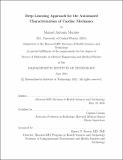Deep Learning Approach for the Automated Characterization of Cardiac Mechanics
Author(s)
Morales, Manuel Antonio
DownloadThesis PDF (28.18Mb)
Advisor
Catana, Ciprian
Terms of use
Metadata
Show full item recordAbstract
Cardiac mechanics reflects the precise interplay between myocardial structure and contraction essential for sustaining the blood pumping function of the heart. Ejection fraction is the usual index of function, yet mechanical impairment and even heart failure may occur without changes in this measure. Strain analysis provides more meaningful measures through non-invasive evaluation of myocardial deformation from cardiac magnetic resonance imaging data, and can therefore identify dysfunction before reduction in ejection fraction. Diagnosis based on strain measures requires highly accurate and repeatable cardiac tissue detection, labelling, and tracking. These are very challenging and time-consuming tasks requiring extensive technical and clinical expertise, and have many sources of error that limit the wider clinical adoption of strain analysis.
In this thesis, a novel deep learning workflow termed DeepStrain was developed and validated to provide automated strain analysis from standard magnetic resonance data. DeepStrain integrates three convolutional neural networks designed specifically for accurate and precise myocardial tissue detection, labelling, and tracking. These
networks were trained using data from healthy subjects and cardiac patients. In healthy subjects, accuracy was evaluated using the gold standard strain analysis technique, and repeatability was assessed using data from subjects imaged multiple times. Finally, DeepStrain was tested in a prospective cross-sectional study in asymptomatic young adults with a mixture of cardiovascular disease risks factors, i.e., overweight, hypertension, and type 2 diabetes mellitus. In summary, DeepStrain automatically provides very precise measures of strain two orders of magnitude faster than current technology, enabling more accurate and comprehensive characterization of cardiac mechanics.
Date issued
2021-06Department
Harvard-MIT Program in Health Sciences and TechnologyPublisher
Massachusetts Institute of Technology